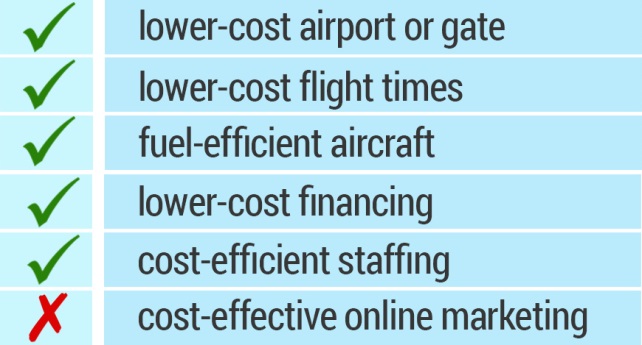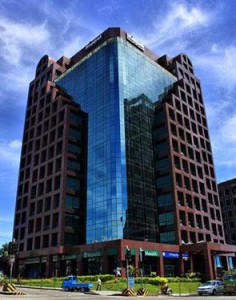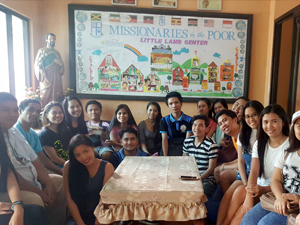Many LCC’s Are Very Inefficient in Online Marketing
The entire concept of LCC’s is based upon operating efficiency and having very different cost structures than legacy airlines. LCC executives are focused on finances, operational efficiency, and ROI. They strive to have lower cost structures and more efficient operations than legacy airlines. However, many LCC’s are notoriously inefficient in buying online media and managing online marketing campaigns.
Surprisingly, many LCC’s hire the same large high-cost media agencies used by high-cost legacy airlines. These media agencies are usually subsidiaries of huge global advertising holding companies, with very high cost structures, multiple layers of administration and management, high-rent luxury offices, big entertainment budgets, and the obligation to constantly deliver quarterly and annual revenue and profit growth.
Many LCC’s pay far more than they should for high-priced media, and try to compete with legacy airlines and with other LCC’s using legacy agencies, legacy marketing methods, and the same high marketing cost structure as legacy airlines. This makes absolutely no sense. It’s like the management of a LCC deciding to serve unlimited champagne, lobster, Kobe beef, and truffles to every passenger.
It is perplexing that LCC executives, who are usually focused on cost-efficiency, very often lose this focus when it comes to their choice of media agencies and how they spend their marketing budgets.

Globalis Media ran test campaigns for one of the pioneering LCC’s in Asia in their hub market. We lowered the LCC’s eCPA (cost per flight booked) by 85% vs. what they had been achieving when using a media agency belonging to a huge global advertising holding company. The LCC asked Globalis to run additional test campaigns in a second market. Once again, we lowered their cost per flight booked by over 80%. The LCC kept taking away more and more of their media budget from the “legacy” agency, and awarding it to Globalis, until we had won much of the LCC’s total online advertising business away from the high-cost legacy agency. We ended up buying media and managing the LCC’s online advertising campaigns in virtually all of their many markets. We have repeated this kind of successful online marketing cost reduction again and again for several LCC’s.
LCC Evolution and Online Marketing Strategies
To best serve the needs of LCC clients, a media agency must fully understand the LCC business in general, and each client’s business specifically. The agency should consider such factors as: Is the campaign being done in the LCC’s home / hub market, or in an outstation market? What is the level of the LCC’s brand awareness in each market? How long has the LCC been flying a particular route and advertising in a particular market? Is the LCC a new company, a relaunch / repositioning, or a spinoff? What are the LCC’s other marketing and communications activities?
Regrettably, few media agencies understand the specific needs and brand / route life stages of LCC’s well, and so agencies just commit the LCC’s marketing budgets to generic online marketing plans and expensive media that often don’t evolve in sync with the LCC’s evolution. LCC’s need specific online marketing strategies and tactics for various phases of their evolution, different competitive scenarios, and different objectives in each market. The following is an example of how marketing objectives and key performance metrics might evolve for LCC’s:

The above table is not intended as a specific recommendation to apply to all LCC”s in all situations. Rather, it is intended as a general illustration of how LCC’s and their media agencies need to evolve marketing strategies, objectives, and key performance metrics as an LCC evolves in each market. Competitive developments and market dynamics also often influence LCC operations on each route, and the media agency should stay abreast of market dynamics and adjust online marketing strategies accordingly.
Understanding Online Marketing Performance Metrics
There are many different performance metrics in online marketing. It is imperative that LCC’s and their agencies focus on the correct performance metrics for each specific online marketing objective at each point in an LCC’s life cycle evolution in each market. Many media agencies and many LCC advertisers don’t use online campaign performance metrics optimally. Therefore, online media strategies and tactics are often flawed, media buying is inefficient, online advertising campaigns are run sub-optimally, and much marketing budget is wasted.
Many different online metrics can be very important early on in the marketing life cycle of a LCC, or for a new route. Just as online marketing strategies and tactics must change over the life cycle of a LCC in a given market, the campaign metrics used to evaluate performance also need to change. Ultimately, in most cases, the measure of success for online marketing should be how many flight bookings can be made, at what cost, and if a company’s online marketing is profitable. In Globalis Media, we view it as our mission to have our clients’ online marketing operate as a profit center, rather than as a cost center.
Clicks, Click-through Rate, and Effective Cost per Click
Many agencies and advertisers focus heavily on clicks. Focusing on clicks is great for media agencies because it’s very easy to optimize campaigns for CTR, clicks, and eCPC, and click-based models are very lucrative for agencies, online ad platforms, and media publishers. Media owners and agencies can easily generate a high volume of clicks and receive high revenues from advertisers. However, for display advertising, click-based models rarely serve the best interest of LCC’s. Ultimately, LCC’s investors and other stakeholders do not care about numbers of clicks, CTR, or eCPC. For our LCC clients, we primarily focus on how many tickets our clients sell via online marketing (conversions), and how much it costs to sell each ticket (eCPA: effective Cost per Acquisition).
Many advertisers and agencies assume that higher CTR and more clicks will lead to higher conversion and better (lower) eCPA. In fact, what we have observed over several years managing online campaigns for LCC’s and many advertisers in other industries is the opposite: there is often a reverse correlation between click rate and conversion rate. We have confirmed the reverse correlation between click rate and conversion rate with many online marketing industry veterans. While this seems counter-intuitive, there are various reasons for this apparent anomaly. For airlines, in particular, this is due, in large part, to the importance of post-view conversions, which have nothing to do with clicks or CTR.
Most DSP’s give campaign managers a choice of either optimizing campaigns by CTR and eCPC or by eCPA, and campaign managers can use various tools to either reduce eCPC or increase conversions. It is very important to understand that prioritizing clicks or conversions is usually an “either / or” proposition. Agency campaign managers taking the easier option of prioritizing clicks rather than conversions (flight bookings) may, in fact, not be working in the best interest of LCC advertisers. We wrote a piece entitled, “1998 called … It wants it’s ‘Pay Per Click’ ad campaigns back”, which can be viewed here.
A LCC’s evolutionary stage and brand equity may greatly influence CTR in each market. Creative execution and the ad offer can also play a big role in CTR. Obviously, ads promoting $1 air fares are likely to achieve much higher CTR than $99 fares.
The specific targeting of each campaign and each line item impacts CTR and eCPC. We run some travel line items very broadly to increase reach and conversions, some line items with a moderate degree of contextual targeting, some line items contextually targeted only to travel-related web sites, and some line items niche-targeted to air travel or budget travel or travel to a specific destination. A broad-based line item might generate a 0.1% CTR, while a travel-specific line item might generate a 0.3% CTR, but if the travel-specific media cost 5X more, then the broad-based line item would out-perform the travel-specific line item on eCPC, while also likely generating much higher click volume. However, superior performance on click volume and eCPC does not necessarily translate into superior performance on conversion rate or eCPA.
Retargeting campaigns tend to generate 2X – 5X higher CTR vs. other line items. But retargeting campaigns are most successful when broader-based campaigns are used to generate a relatively high volume of site visitors at reasonable eCPV (effective Cost per Site Visitor).
Conversions / eCPA
We have helped LCC’s generate millions of flight bookings. Obviously, volume of flight bookings (conversions) depends upon very many factors, including number of markets, which markets, market / catchment area size, population per market, number of years in each market, competitiveness of each route, fare strategy, flight distance, etc.
eCPA usually decreases over time as an LCC gets more “established” in a market / route. For example, we have seen many cases in which eCPA in the first or second month might be US $50, decreasing continuously every month to $10 or less within one year, and much lower the next year.
Retargeting campaigns tend to generate 5X – 10X higher conversion rate vs. other line items. For most LCC’s, post-view conversions greatly exceed post-click conversions, and so it is very important that both types of conversions be counted.
Impressions and eCPM’s
Globalis Media has found that the best strategy for helping our LCC clients to successfully launch and grow their business is to run multi-faceted campaigns consisting of many different line items working synergistically. Some broad-based line items have very low CPM’s, while some line items with narrow contextual targeting have relatively higher CPM’s. Retargeting line items have higher CPM’s to be competitive to win as many real-time bids as possible, due to the high-potential value of retargeting imps, i.e., users being retargeted are much more likely to click and to convert (book a flight).
CPM bids are important to Globalis Media as one of the many variables we use to buy media and manage online advertising campaigns for our LCC clients. But, as with CTR, clicks, and eCPC, we recommend that clients not pay too much attention to CPM costs in evaluating online marketing performance. For example:
Media #1: $5.00 CPM, $1,000 buys 200,000 impressions, producing 200 flight bookings @ $5.00 eCPA.
Media #2: $0.50 CPM, $1,000 buys 2,000,000 impressions, producing 100 flight bookings @ $10.00 eCPA.
In this example, the media costing a 10X higher CPM generates 2X more flight bookings at a 50% lower cost per flight booking, with the higher CPM being of little significance.
Using Precise Geo-Targeting to Improve Campaign Performance for LCC’s
While most agencies and advertisers now know how to do basic, national geo-targeting, few are adept at using geo-targeting on a more local basis, such as by state, province, or city. Ironically, many smaller, local businesses seem more knowledgeable about local geo-targeting than “major” media agencies and international corporations. Many agencies and advertisers, lacking knowledge of how to geo-target campaigns, mistakenly run campaigns nationally in cases where it would be better for advertisers to use regional or local targeting.
Airlines often waste much of their online marketing budgets using national targeting when, in fact, the catchment area for the airport(s) they serve in a country is just a small portion of the total country. Globalis Media has saved many airlines cumulatively millions of dollars by implementing intelligent local geo-targeting to replace wasteful national targeting that had been used prior to Globalis correcting geo-targeting.
An LCC was spending much money on online marketing in India, but generating relatively few flight bookings, and suffering significant losses in India. Globalis Media was called in to help rescue the LCC’s India business, and we immediately noticed that the incumbent “major” media agency had been running the LCC’s online ads across the entire, vast country of India, wasting approximately 90% of the LCC’s budget, and resulting in huge losses with no ROI on marketing expense. Globalis quickly fixed the problem, geo-targeting the LCC’s online ads to the few states within the catchment areas of the specific local markets served by the LCC. After implementing this correct geo-targeting, the LCC started to quickly see a huge improvement in marketing cost-performance and growth in their India business.
Significant cost savings and superior online marketing cost-performance can be achieved by fully leveraging the power of precise geo-targeting combined with precise language targeting and effective contextual targeting. Globalis Media has run campaigns for advertisers targeting specific regions, prefectures, states, provinces and cities in dozens of countries.

Using Precise Language Targeting to Improve Campaign Performance for LCC’s
Few LCC’s and media agencies have expertise in using language targeting in online marketing campaigns.
In Singapore, 50% of people speak Chinese as their primary language at home, while 32% speak English, 12% speak Malay, and 6% speak other languages. When we were asked by a major LCC to help them to grow their business in Singapore (and other markets), we were absolutely astounded to find out that the “major” media agency they had been using had been using only English-language banners in Singapore. While the benefits of a media agency being owned by a huge, global conglomerate are not clear to us, what is clear to us is that LCC’s media agencies must know their clients’ local markets very well. Ignoring the 50% of Singaporeans who speak Chinese as their primary language indicates a poor understanding of the Singapore market. Globalis Media has been successfully leveraging the power of precise language targeting for our clients since 2006.
In another country, another LCC had very poor performance on English-language banners, and were not running any banners in the local language – until we informed them that that country has the lowest penetration of English speakers among local populations in Asia. They started using in their online ads the language that locals could actually understand and their online bookings increased significantly.
Companies and agencies without language targeting expertise might assume that countries with relatively homogenous populations speaking one common language don’t have opportunities to use language targeting. But Globalis Media has proven this to be wrong. In a country in which 98% of the population speak the local language, an LCC was doing the logical thing, using only local-language banner ads. Globalis recommended that the LCC also run English-language banners to reach the segment of foreigners which, we believed, were under-served and under-targeted by other airlines. We also hypothesized that the relatively small segment of foreigners had a higher frequency of international travel than the indigenous population and were also very much more likely to try a start-up airline. We were right, and the LCC did surprisingly well targeting a market (language) segment that they had originally ignored prior to our recommendation.
In many countries, Globalis runs creatives in both the native language and English, targeting each user based upon their browser language settings. This has proven to be a very successful user targeting strategy for our clients in many countries – particularly for LCC’s.
Globalis usually uses language targeting combined with precise geographical targeting, contextual targeting, retargeting, and other strategies and tactics to show advertisers’ online ads in the right language, to the right users, in the right place, at the right time.
Understanding Local Markets and Cultures
It is imperative that media agencies understand very well the local markets and cultures served by their LCC clients. LCC’s are known for providing “value” to consumers. But “value” is perceived differently by different cultures. In some markets and cultures, people may choose a non-direct flight adding several extra hours to their travel time just to save $50, while people with other cultural perspectives may value convenience and time savings higher than they value cost savings of $50.

Short-Haul vs. Long-Haul Flights Require Different Marketing Methods and Messaging
As more LCC’s venture into longer-haul flights, it is very important to understand the significant differences between short-haul and long-haul flights. We encourage LCC’s to ask their media agencies about these differences. The Globalis Media team is available to discuss this with prospective clients.

Globalis Media and LCC’s
Globalis Media has been buying media and managing online advertising campaigns cost-effectively for various companies since 2006. Globalis has helped many LCC’s to successfully launch and expand their business. Many LCC’s have found Globalis Media to be an ideal partner, since our mission of providing low-cost online marketing services is totally consistent with LCC’s mission of providing cost-efficient air travel.
Contact Globalis Media.









;[/insert_php]/images/moving-recent-ppc.jpg)
;[/insert_php]/images/leads.jpg)
;[/insert_php]/images/remarketing.jpg)
;[/insert_php]/images/mortgage-recent-ppc.jpg)
;[/insert_php]/images/lawyers-recent-ppc.png)



























